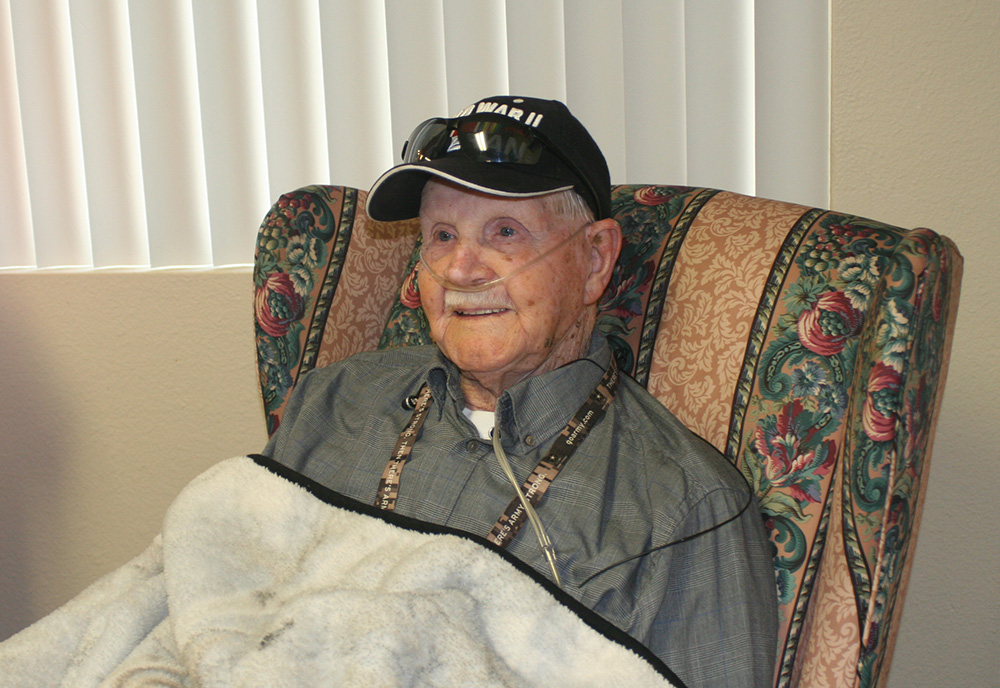When Linda Fraunfelter heard about the VA Medical Foster Home program she contacted Ruby Rideout, a coordinator at the Prescott VA Medical Center in Arizona.
Two months later, after application, reference checking, training and multiple VA home inspections, Fraunfelter took in her first Veteran, Betty Dodd, 91.
A medical foster home is an alternative to a nursing home in a personal home setting, for eligible Veterans who are no longer able to safely live independently.
The Prescott VA implemented the Medical Foster Home Program in March 2012 and today has four homes in the community serving six Veterans.
VA’s Home Based Primary Care (HBPC) team is an integral component of the Medical Foster Home program, and staff from HBPC makes visits to provide home assessment, caregiver support and education.
Direct patient care and oversight for the medically complex Veterans placed in homes is a vital aspect of the program.
Fraunfelter describes herself as a natural caregiver and has worked in various settings as a caregiver over the years. She decided to give a medical foster home a try so she could be at home for her parents more and also to provide her mother with companionship.
Offering personalized care
She identifies with the medical foster home concept because it limits the number of people being cared for to three, allowing her to offer personalized care. “You have to have a big heart to do this work – a smile, kindness, gentleness and patience to bring joy into their life.”
Betty Dodd served in the Marines during the Korean War. When asked what she likes best about being in the Medical Foster Home, Dodd replied, “It’s sincerity. I feel comfortable. I think I belong here.
Fraunfelter is especially appreciative of the support she gets from the VA Home Based Primary Care Team and the Medical Foster Home coordinator. “I always get a response from the team in adequate time. We are provided with a training course every six months which is very helpful. The team is very caring, willing to go the extra mile to help the caregiver and the support is always there for you and I love it. I have a sense of purpose every morning when I wake up.”
“They make you feel at home.”
Another couple taking care of Veterans in their home are Robbin and Mike Dohm in the rural community of Chino Valley.
When the Dohms learned about the VA Medical Foster Home program at the Prescott VA, Mike contacted Ruby Rideout.
The first Veteran they took in was Mike Brown, 69, who served in the Army during the Vietnam War. Brown likes the security of where he lives: “It’s a place where they make you feel at home. They include you in their activities.”
“The support is always there for you.”
He appreciates that he has the freedom to move about the home and to take walks down the lane. Since moving into the Medical Foster Home,Brown says, “I think my health has improved.” The Dohms host a second Veteran, a 96-year-old WWII Army Veteran who believes: “The VA is the greatest organization. They have been helpful to me. Robbin is a good caregiver. I give God credit. He saw me through a depression and a war. He’s taken care of me.”
A medical foster home can serve as an alternative to a nursing home. It may be appropriate for Veterans who require nursing home care but prefer a non-institutional setting with fewer residents.
About the Author: Mary Dillinger is the public affairs specialist for Northern Arizona VA Health Care System
Topics in this story
More Stories
Study underscores important role COVID vaccination can have in protecting Veterans from infection and reducing long-term health consequences
Columbia VA’s robotic surgery teams completed their 800th robotic surgery and are on schedule to hit 1,000 by the end of the year.
In a decentralized clinical trial, Veterans can participate from their own homes or local VA instead of having to travel to a research site.







